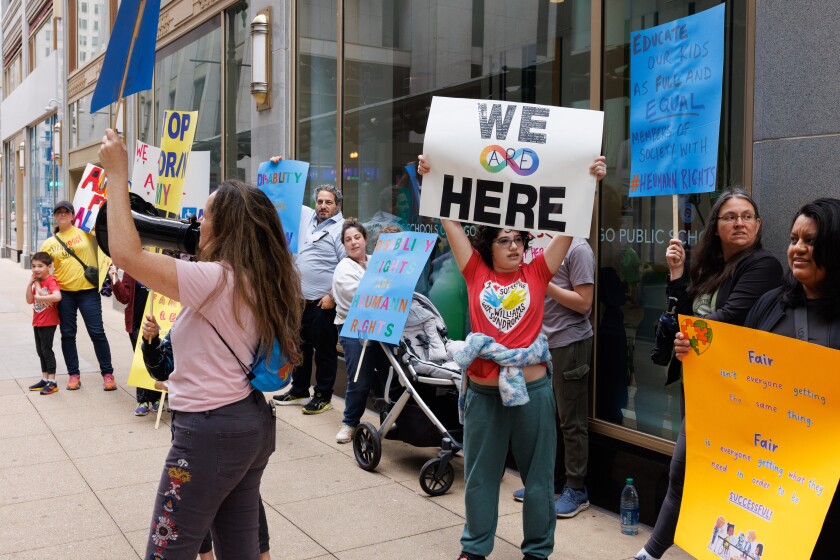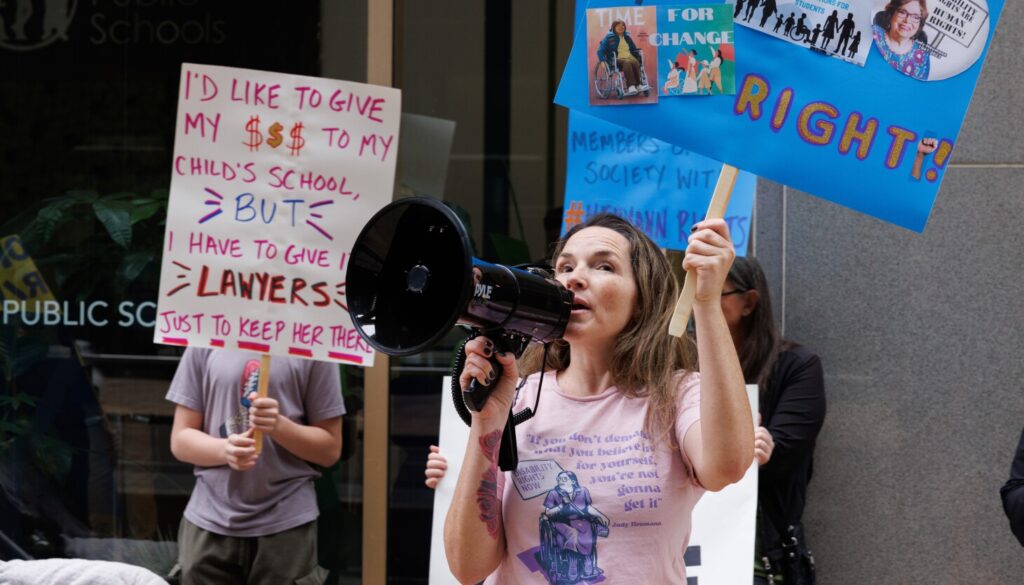Chicago public schools are trying to overhaul A special education program that has been in trouble for years. The latest developments in January are install a new chief We offer a variety of learner supports and services to address a variety of issues.
But CPS parent groups say the district is not doing enough and is still discriminating against students with special needs. More than half a dozen parents protested in front of CPS headquarters in the Loop on Monday, demanding better treatment for children with special needs and their parents. They claim they are struggling to get the help they are legally entitled to.
They are unhappy with the district's policy of placing special needs students in cluster programs separate from the general school population, which they argue has a negative impact on development. They want to expand special education programs in all neighborhood schools and translation services for parents of non-English speaking special needs students. They also want 100% access to CPS schools.
“Across the city, parents must fight to get their children with disabilities supported in school,” said Amy Nussbaum, a CPS parent who organized the protest. Parents held placards and shouted through loudspeakers, “The rights of people with disabilities are human rights.''
Nussbaum decided to protest after experiencing her own “nightmare” trying to get special education services for a nonverbal kindergartener with Williams syndrome.

Parents of students with disabilities enrolled in CPS protested in front of CPS headquarters in Loop on Monday. They are unhappy with the district's policy of placing special needs students in cluster programs separate from the general school population, which they argue has a negative impact on development.
Anthony Vasquez/Sun-Times
She said CPS would not allow her child to enroll in the neighborhood school because appropriate services were not provided. After Nussbaum won the lottery at her selective enrollment school, Hawthorne Scholastic Academy, she said CPS tried to kick her child out two months later. But she said the school allowed her daughter to stay after Nussbaum got her attorney and defense attorney involved.
She said CPS' attempts to expel children are illegal and said she has tried to contact CPS leadership to change that policy. These requests were either denied or ignored, she said. She said not every family has the resources to fight like hers.
CPS said in a statement that the success of students with disabilities is its top priority.
CPS is committed to addressing community concerns, with the Board of Education establishing a Special Education Advisory Committee last summer comprised of parents, CPS leaders, advocates, and experts to listen to community concerns. He said he was.
“As a school district where more than 15 percent of our students have Individualized Education Programs (IEPs), we understand the historical challenges that families have faced and are working to improve services and resources for students with disabilities. “We are determined to do so,” CPS said. That statement. “We remain grateful to the many parents and advocacy groups who have worked with our district over the years to advance our systems to improve our services and care. Masu.”
CPS says this year's budget includes an additional $120 million for supports and services for students with disabilities and to hire a record number of special education teachers.
Accessibility remains a challenge for many CPS facilities. The district stated in its fall 2023 strategic plan: $580 million was needed To address ADA accessibility in schools. CPS said it would commit $100 million The 2021 budget aims to address ADA accessibility to parking lots, main entrances, major offices, and public restrooms over a five-year period.
According to CPS's last facility assessment for the 2021-22 school year, approximately one-third of CPS campuses are not ADA accessible. Another third of the school is considered “first floor usable,” which means his first floor of the school is ADA accessible, according to CPS. The school said 167 of its 522 campuses, or just under a third, have been deemed ADA compliant. The district projects that by the next evaluation in 2025, one-third of the remaining non-conforming schools will be upgraded to “Grade 1 Usable.”
Another problem is the lack of translation services for parents of special needs students who do not speak English.
Erika Nava, an organizer with Raise Your Hand for Illinois Education, is working with 10 CPS families this school year who are struggling to create individualized education plans for their children with special needs. He said he spoke. That barrier makes it even more difficult for families, she says.
“Parents give up after a while. They feel like they don't have support,” Nava said.


